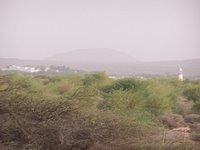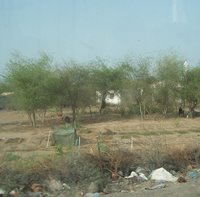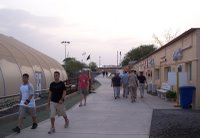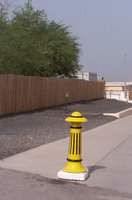Ah, well. It's Sunday. Don't ask me how I know this; normally I can't tell Tuesday from Friday and don't think it matters. I think the weeks go faster when you wake up and suddenly realize, hey, it's Friday already. I usually realize that because they play different music over the excruciatingly loud speakers right outside my tent on Fridays and Sundays. Also, on Sunday, we have steak for dinner. Without fail. It's kind of nice, although the steaks are usually medium-well, which is just fine since I'd rather have medium-well steak than have half the base falling out with food poisoning. Probably what the cooks are thinking, too. That said, it isn't dinnertime yet. It's not even lunch.
Lately I've been feeling a little… off. Not sick, just, not right. Mistake-prone. Distracted. Partly this is because I'm bored off my botty, but that's not the whole matter. Last night I went over… well, everything, everything I've been deliberately
not thinking about the last few weeks (it's been five already! Only fifteen more to… uh… let's not think about it). Like, when or if I'm going to get word from the AF about separating; when, whether, where to move; whether to go to law school; what to do if I don't; how I'm going to try to sell this book; and a couple other things I won't belabor here. I didn't flee to Africa to avoid these matters, but there's not much I can do about them from out here. Consequently I've avoided even the one thing I
could be doing here, which is thinking and praying about them.
I only decided on one thing last night. I decided that, since I went to bed so much earlier than usual (ten-thirty! I haven't gone to bed before midnight since the first week I was here), if I got up at a reasonable hour I'd go to church.
I don't go to church regularly. I haven't gone to church regularly since I lived in Valdosta in 2001-2002. In fact I'm still a member of the church in Valdosta. I miss it there. I felt at home at that church.
There was only one Methodist church in Del Rio and I only went a few times. The place had a strange country-club vibe—
everybody was a white Anglo, though Del Rio as a whole is maybe 20% white Anglos. It felt like conscious segregation, whether it was or not, and I had trouble hearing the message through the blinding whiteness. Yes, I'm aware that I'm a white Anglo, but I still felt weird.
Tampa has been another matter; although there are dozens of churches I could attend in Tampa, the ones I've been to haven't felt especially… haven't felt right. I don't feel at home at Hyde Park, didn't feel moved at Palma Ceia, haven't found where I fit in at First in downtown. I don't especially feel like driving fifteen miles into the burbs, either, so I haven't bothered; call me a sinner for that if you want, it's true enough for other reasons.
So I haven't gone to church more than a couple times a year for, oh, four years. The other day in the library—which is where I'm sitting right now as I compose this—I happened upon a book called
 Planted
Planted by Robert Gay. I skimmed it, didn't read it, so I won't put it on the book list. Mostly I didn't read it because of the first chapter. The later chapters that I skimmed made sense.
The book encourages its readers to find a church where they can be comfortable, and plant there. Become a member, but not just a come-on-Sunday-and-doze member, but an active member of that particular Body of Christ. A good message, one I should listen to. The book also encourages an understanding of what it means to keep the Sabbath—that you aren't living in sin if your job requires you to work Sundays, because the meaning of keeping the Sabbath holy is taking time to rest and recharge spiritually—and if you can't do it on Sunday, do it on Tuesday. Or if you have to work half a day on Sunday, fine, but spend the other half in communion with the Lord and not the lawnmower.
All good messages. And one I suppose I need to hear, if only to keep it in my heart until my return. The chapel here on camp is not the church God wants me to be planted in, I'm fairly certain of that (I'm not sure God means this part of the world to be inhabited by humans at all, to be frank). But I can at least attend. If nothing else, if I do nothing else, I can hear the word and the sermon and find meaning there, more meaning than I'll find lying on my cot in the tent for twelve hours a day because I don't sleep well enough to feel rested. No question but that my faith could use a recharge—I haven't, after all, been keeping the Sabbath.
But the first chapter of that book, the first chapter… planted. Get planted. Robert Gay is a pastor in the Florida panhandle, and since he has one of those names that sounds odd when used in reference, I'll just call him 'the pastor'. The pastor probably didn't intend for that first chapter to be taken the way I took it. But maybe he did. Maybe my readers have input here.
The chapter starts with a passage from the 92nd Psalm:
Those who are planted in the house of the Lord shall flourish in the courts of our God.
The pastor says, "God wants His people to be planted in a local church." No problem there; he knows whereof he speaks, much better than I do certainly, and I've no quarrel with the notion. Why would Christ have referred to the Church as His body, as his bride on Earth, if He didn't intend for his followers to go there, to worship there, and to have fellowship there? I've tried to make Hyde Park feel like a church family to me, but it doesn't work.
It's the next section that troubles me. Faith isn't meant to be easy, but this is… well, here it is.
The word planted conveys the meaning of being stationary or permanent. When something is planted, it does not move around… It is in a fixed location… I believe the Father is saying to His children today, "Get somewhere and plant it!"
This is probably the single most challenge passage I've read in a spiritual book in several years. Why? Because
I am not happy where I am. How can I heed a message to plant there if I am dissatisfied? Am I to take it that my dissatisfaction with the place where I live (Tampa, not Africa; work with me here) is a product of my failure to find a local church?
I'm okay with that notion. But I'm struggling with two things. One, I don't feel at home at the churches I've attended there. I should, I suppose, continue to look. Two, I don't think I'm supposed to stay in Tampa long-term. In fact, I've never felt happy staying anywhere long-term. I don't think being "planted," at least geographically, has ever been satisfying for me. More on that one later. For now, back to the first point, not having found a church home in Tampa that seems a reasonable fit.
For so long, in the body of Christ, we have had those who would bounce around from church to church. Many times we have referred ot spiritual floaters as "church-hoppers" or "cruisamatics." [I've never heard either of those terms before.] They cruise around to all the churches in the city usually causing problems wherever they go. This is not the plan of God for any believer in the Body of Christ.
It may be that I'm pushing this paragraph to be deeper than the pastor intended it to be. One could interpret this paragraph this way:
Wherever you find yourself, plant there. Find a church in the city of your residence, get comfortable, become a member, give of yourself, grow spiritually through your membership and service.
If that's right, then I don't feel too bad. I don't consider myself a church-hopper in the sense the pastor's using it above. I don't walk to the nearest church as soon as I move in and make it my church home right away. I also don't think there's anything wrong with that. I intended to find a church home in Tampa. I just didn't. But if the pastor's injunction is simply that—find a church home in your community and plant there—I can work with that. I need to, certainly.
For some reason, though, my mind cannot resist the following interpretation of the above:
Settle down in some community and never leave. God hates it when you move from city to city.
Okay, maybe I'm adding a little editorial bent to that. But you get my drift.
It shouldn't be any particular secret that I'm considering leaving Tampa once I'm out of the service. A number of places come to mind, Charlottesville, Chapel Hill, Atlanta. I've given thought to Austin, but it's farther than I wish to go. I've considered returning to Clemson, but although I have strong emotional ties pulling me back it would just be an attempt to "go home again," and would result in heartbreak as such attempts always do. Asheville would be nice. Let's face it, the list of cities I would like to move to runs into the dozens, possibly the hundreds, and after I've moved there and lived there for a few years I will get itchy, and the list of places to which I'd like to move will start to expand again, and I'll pick up and move.
And I feel like—feel, don't know, but believe in the depths of my being—that the pattern will repeat.
This does not upset me in the slightest. It isn't that I grow weary of places; I simply don't feel anchored geographically. I don't want to be anchored, geographically.
I don't hate Tampa; don't think that. I don't hate any place I've lived. For God's sake, I love Del Rio. Love it. Nostalgia plays a part in that, and I was ready to leave the town when I did. But I made it my home. I made Avon Park my home. I made Valdosta and Clemson and Fort Lauderdale my homes—although I will admit that I hated Fort Lauderdale. Only place I've ever hated, although it took me a long time to get to like Jacksonville, and I'm still ambivalent at best about Orange Park. Jacksonville I could move to. Orange Park, no. But it's home, so I don't hate it. I don't expect to hate any place. I just don't expect to stay.
I could have stayed in Valdosta longer. Since Valdosta is also the last place I had a church home, there may be something to the notion that I feel compelled to move since I don't have a spiritual home in which to plant myself, and that if I had said spiritual home, I would be inclined to stay.
But that's speculation only. Valdosta is a nice town. The church there was a wonderful church, and if I hadn't spent most of my year there in a 12-hour-a-day job I think I'd have done more as a member of the church than I did. But although part of me likes the notion of going back there, I don't really think Valdosta would be able to keep me long-term. Perhaps. Perhaps not.
This is more troubling, I guess, than I let on earlier. At one point in my life I was going to get in to politics, something that obviously would have required me to pick someplace and stay there long term. Lack of desire to stay someplace is not what's made me quit my political ambition, but it is a new feature, or at least if it's an old feature it's only recently that I've recognized it.
I haven't gotten anywhere, just rambled. So I'll go back to my interpretation of the pastor's statement:
Settle down in some community and never leave. God hates it when you move from city to city.
Regardless of whether I'm interpreting the pastor's words correctly, the question remains. Do I have it right? Are we meant to settle in one place and not leave? Obviously jobs move us from time to time, and I don't imagine God wants us to accept poverty rather than move to follow a job. But moving just because… well, I want to.
Faith is, as I said, not meant to be free of challenges. Is this a challenge? Or is it just my feeble mind giving vent to a fear I won't admit to?































